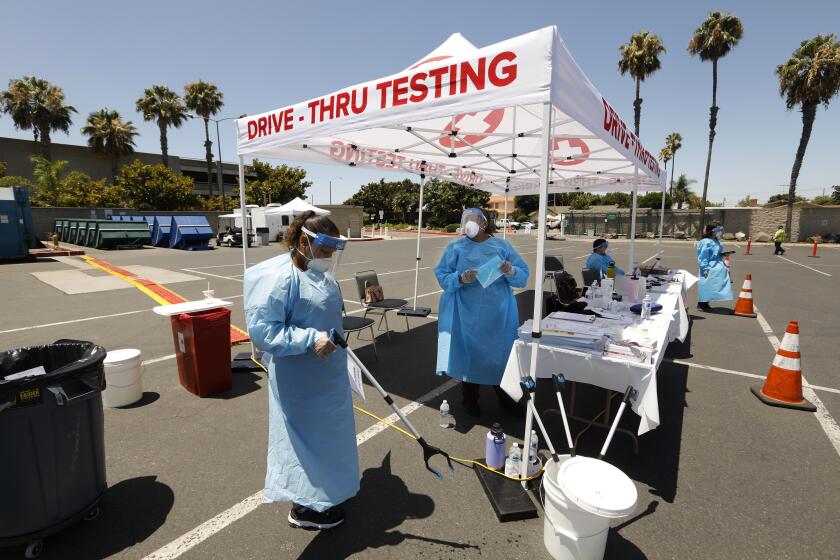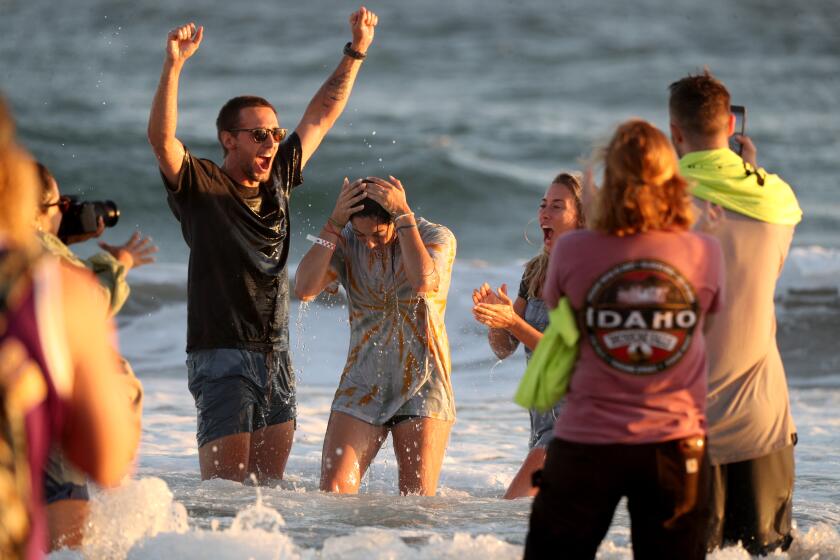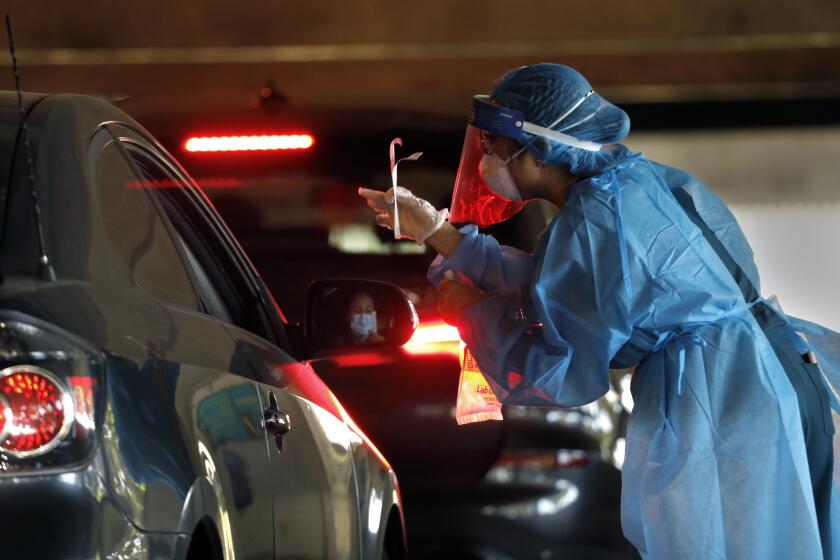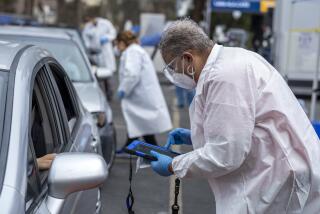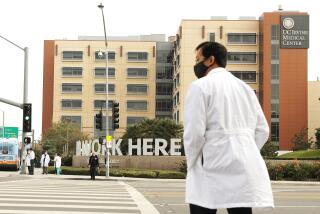Orange County now has second-worst coronavirus outbreak in California
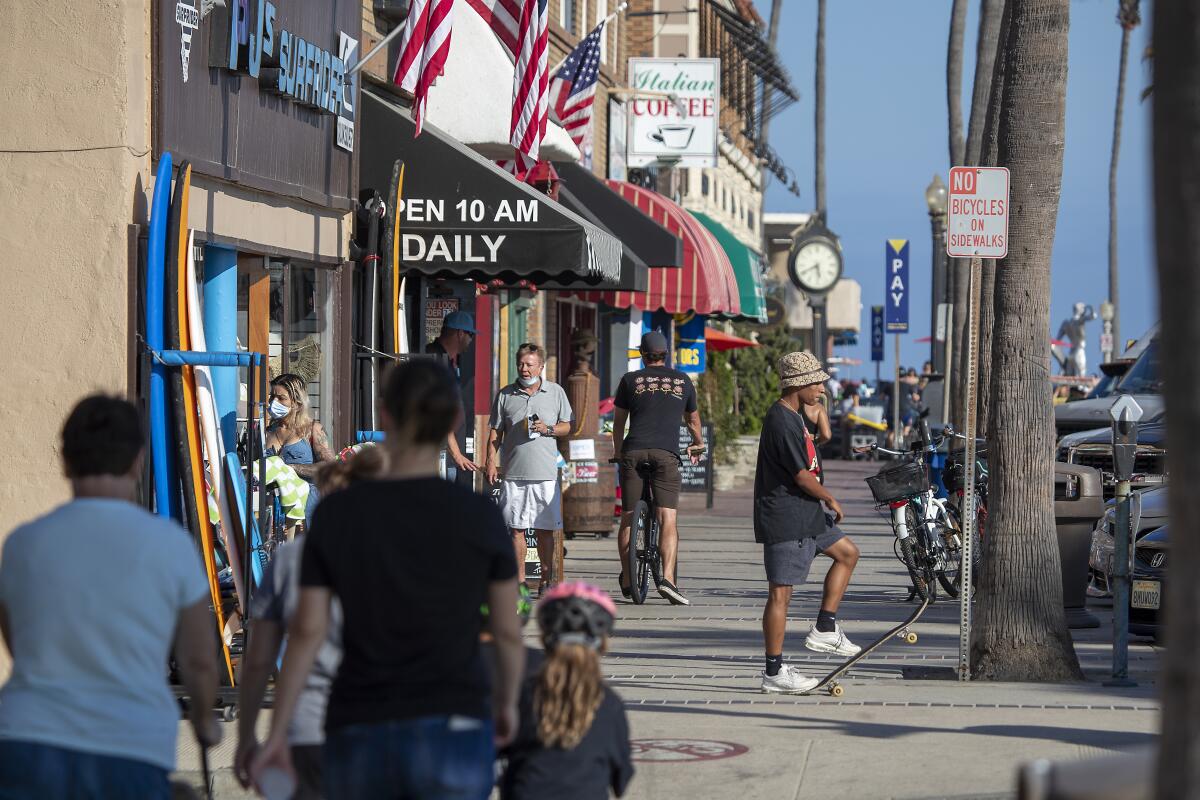
Orange County now has the second-most coronavirus infections in California, as the region and state continue to grapple with sharp spikes in the number of confirmed cases.
The cumulative COVID-19 case count in Orange County was 29,986 Tuesday, just ahead of Riverside County’s 29,983. Only Los Angeles County is higher, with nearly 160,000 cases.
Over the 14 days leading up to Tuesday, Orange County reported 12,104 additional COVID-19 cases, a figure that trailed only that of Los Angeles, according to The Times’ coronavirus tracker. During that same time, Riverside County confirmed 9,428; San Bernardino County, 8,754; and San Diego County, 7,135.
When accounting for population, however, Orange County has reported fewer overall cases per 100,000 residents than Los Angeles, Riverside and San Bernardino counties, but more than San Diego County.
Orange County reported 25 more deaths connected to the novel coronavirus on Saturday, the third-highest day on record as the number of confirmed cases continues to surge.
Orange County also reported the second-most coronavirus-linked fatalities in the state, 127, over the same 14-day period.
Overall, only Los Angeles, with 4,104 deaths, and Riverside, with 588, have lost more residents to the coronavirus. Both those counties also have seen more deaths per 100,000 residents than Orange County, while San Bernardino and San Diego have seen fewer, according to The Times’ tracker.
During a news conference last week, Orange County Executive Officer Frank Kim said he did not think the region’s case rate was out of line with those of neighboring counties.
“Obviously, there are some days where one county is higher than another,” he said, “but I did not see us as an outlier within the large urban counties in Southern California.”
On Tuesday, Orange County recorded 990 additional COVID-19 cases, health officials said — raising its cumulative total to 30,976. They also reported 20 more fatalities, bringing the death toll to 513.
An estimated 15,232 people have recovered from the coronavirus to date in Orange County, according to the county Health Care Agency.
In a reversal, Orange, Riverside and San Bernardino counties are now seeing higher rates of COVID-19 spread than L.A., long California’s coronavirus hot spot.
During the early days of the pandemic, Orange County seemed to escape the devastating outbreaks and death tolls that hit other parts of the state — especially L.A. The county didn’t top 100 confirmed COVID-19 deaths until May 9, more than two weeks after Riverside County reached that milestone, according to public health data.
Some officials cited the county’s early numbers as evidence that the region was ready to more widely reopen businesses that were shuttered under California’s stay-at-home order. The state gave Orange County the green light to reopen restaurants for on-site dining two days before Memorial Day.
But, as has been the case statewide, Orange County’s reopening of businesses and public spaces has been followed by sharp upticks in confirmed coronavirus infections and hospitalizations. It can take three to four weeks after exposure for infected people to become sick enough to be hospitalized.
On Monday, the state reported 11,554 new coronavirus cases, its highest single-day tally, surpassing a record set a week ago.
With cases increasing at an alarming rate, Gov. Gavin Newsom announced statewide restrictions last week to again halt all indoor dining and close bars, zoos and museums. More than two dozen counties on the state’s monitoring list — including Orange County — were forced to shutter gyms, houses of worship, offices with nonessential workers, malls and indoor operations at nail and hair salons.
Orange County has drawn headlines for politically and publicly pushing back against some of the restrictions meant to help stymie the disease’s spread.
A major point of contention has been whether residents should be required to wear masks. In early June, the county’s public health officer resigned after weeks of verbal attacks, including a death threat, over her mandatory mask rules. Her replacement later rescinded the rules amid intense pressure, instead “strongly recommending” that residents wear face coverings when in public.
Newsom issued a statewide mask order shortly after — though how stringently such requirements will be followed or enforced at the local level remains to be seen.
The Orange County Board of Education also voted last week to recommend reopening schools without requiring the use of masks for students — though specific reopening plans would be left up to individual school districts.
Newsom essentially rendered the issue moot when he announced Friday that school campuses will remain closed in counties on the monitoring list.
“We have seen in Orange County more of a resistance to mask wearing,” said Dr. Robert Kim-Farley, a medical epidemiologist and infectious diseases expert at the UCLA Fielding School of Public Health. “So I think that we are seeing increased transmission — community transmission — in Orange County because of the lower levels of mask use.”
Times staff writers Rong-Gong Lin II and Jake Sheridan contributed to this report.
More to Read
Sign up for Essential California
The most important California stories and recommendations in your inbox every morning.
You may occasionally receive promotional content from the Los Angeles Times.
